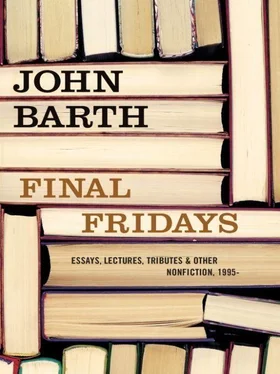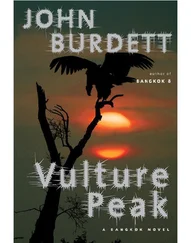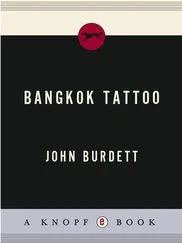That was in 1981. Thirteen years later, in 1994, we had our first ambassador from the vertiginous realm of Hypertext, a.k.a. “e-fiction”: interactive computer-fiction in which the “author” designs a matrix of “lexias” through which the “reader” navigates with clicks of the mouse or the keyboard, perhaps entering or exiting the narrative at any of many available doors and steering the plot along any of many optional way points.
The seminal work on the medium itself ( Hypertext , authored by George Landow of Brown University, but published by our Johns Hopkins Press in 1992) declares hypertext to be the third great technological advance in the art of writing, after the development of the alphabet and the invention of movable type. Some curmudgeons have grumbled that the whole thing is more hype than text, but my comrade Robert Coover, also at Brown, has become so involved in the medium that his official academic title these days is Professor of Electronic Fiction. In 1993, Coover published two landmark front-page essays on the subject in the New York Times Book Review , one called, provocatively, “The End of Books?” (it’s important to hear that question mark at the end of his title), and the other called “Hypertext: Novels for the Computer.”
I INVITE ANY innocents still unfamiliar with hypertext to imagine a “text” (the word is already in quotes, the signal or symptom of virtuality), every word of which — at least many a key word of which — is a window or point of entry into a network of associated “texts” (or graphics, music, statistics, spoken language, whatever a computer can reproduce), these several networks themselves interconnected and infinitely modifiable — or virtually infinitely so — by “readers” who can enter the “story” at any point, trace any of a zillion paths through its associated networks, perhaps add or subtract material and modify the linkages as they please, and then exit at any point, in the process having been virtual co-authors or co-editors as well as “readers” of their virtual text. That’s hypertext.
The quick brown fox jumps over the lazy dog. Imagine a “loaded” display of that innocent proposition on your computer screen, such that “clicking” on any item in it opens a window menu of associations available for exploring, from the relative nimbleness of temperate-zone quadrupeds, through the history of fox hunting and its representation in painting, music, and literature, to soundtracks of hounds in full cry (with or without expert commentary) and disquisitions on animal rights — and every one of those associated “lexias” similarly loaded, another ring of keys with which one may open yet further doors, and on and on and on — no two routes through the maze ever likely to be the same, and every venturer thereinto not only a Theseus but a Daedalus, remodeling the labyrinth at will en route through it. That’s hypertext, more or less, and as a potential medium of art it both intrigues and disquiets me. If the prophets of the American Book Review , not to mention the New York Times Book Review , are correct, as no doubt they are, we’ll be hearing more and more about it as our weary century expires (it has already made the cover of Time ). Indeed, a recent number of the Authors Guild Bulletin (Winter 1995), along with its now-standard cautionary piece on “Fair Use in the Electronic Age,” included its first-ever mention of hypertextual narrative: “Electronic Fiction,” by Sarah Smith (subtitled “The State of the Art”). An articulate practitioner of and apologist for her medium, Smith quotes a fellow hypertextualist’s decription of their art as “designing golf courses with holes that can be played in any order by players with greater or lesser degrees of skill and commitment.” I like that metaphor — although I modestly submit that “ski slopes” would be an even better one, since, unlike golf courses, they have no prearranged sequence to be ignored or altered.
Back to my story. We welcomed our young graduate-student pioneer, Ho Lin — who had already worked with Coover and Landow in Brown University’s vigorous hypertext program — into our Hopkins Seminars, as did our university library into the organizing of its burgeoning CD-ROM operation: a genial and knowledgeable harbinger, I reckoned, of things inevitably to come. Fortunately for us, who had neither equipment nor expertise nor, for that matter, sufficient departmental enthusiasm to deal with this novel medium — it turned out that Mr. Lin’s Hopkins project was a straightforward, engaging, traditionally linear print-novel (“p-fiction,” I guess we have to call it now) about young Chinese-Americans dreaming of Hong Kong and heisting computer chips to get there. At my urging, however, he obligingly arranged “e-fiction” demonstrations for us at the university’s computing facility, and we did a certain amount of disk-and-software swapping.
Now, I’m a book-person myself, but I try to keep an open mind and a mindful eye on the parameters of the medium. I had already read Coover, Landow, and others on the subject of hypertext; if I were 25 instead of 65-plus, I daresay that I would be vigorously exploring its possibilities for my fictive purposes. I rather expected our roomful of talented Hopkins apprentices — who, after all, grew up with desktop computers — to take to hypertext fiction like grade-schoolers to Nintendo. Has it not been the job, after all, of each new artistic generation since the advent of Romanticism to render its senior mentors gently obsolete (what one sociologist has called “filiar-chy,” the rule of the young over their elders, and what others might call “parricide”)? To my surprise, however, I found that I was doing the prodding—“Better expose yourselves to the virus, if only to build up your antibodies,” et cetera — and that they, for the most part, were taking the skeptical Leonard Michaels role. Reading and writing literature in the normal way, most of them felt, is interactivity enough; when we’re being writers, we’ll plot the course for you; when we’re being readers, leave us alone and steer the boat yourself. My feelings exactly — more or less exactly, anyhow — but I confess that it was a touch dismaying to hear them voiced by young apprentices.
In any case, their sentiments are sound, I believe, if unadventurous. Note that their reservations were not to the tiresome business (as many of us find it) of reading for pleasure off a video display terminal rather than curled in a comfortable chair; we agreed that by this century’s turn, the hardware for hypertexts will likely be as portable and maybe even no harder on the eyes than that jim-dandy item of low-energy, high-density information technology, the printed book. Nor had they anything against hypertext as a high-tech mode of reference browsing. What they objected to, and in this I’m much more with them than not, was mucking around with the traditional job-descriptions of Author and Reader. “You don’t like the restaurant? Then dine elsewhere — but stay out of my kitchen while I’m cooking for you, please, and I’ll return the favor.” (You ought, however, to try the hypertextual broccoli before making up your mind.)
I mention these two instances, from fifteen and two years ago, as straws in the potentially much bigger wind of Electronic Virtual Reality, which I won’t attempt to consider more than briefly here. My point is that although a few of us still prefer to compose our sentences in longhand before turning them into pixels on a computer monitor en route to their returning into print on a page, and a few more prefer still to eschew computers altogether, the super-convenient word-processor has become, in only a dozen-plus years, the production mode of choice for most writers of most kinds of writing, whether or not it affects the quality of the product. Interactive computer fiction (especially as it comes to include whole repertories of graphic, cinematic, and auditory effects) is too fascinating not to become yet another competitor for audience attention, but one doubts that it will have nearly the market-share effect on “straight” fiction-reading that movies and television — and, more recently, surfing the Internet — have had already. Those of us who still read literature for pleasure at all (no more than 10 percent of the adult U.S. population, says the New York Times ) are likely to go on preferring, most of the time, the customary division of labor between Teller and Told. The Authors Guild’s justified concern with the protection of authorial electronic rights down the Infobahn is more commercial than aesthetic: a concern more about copyright than about readership. E-fiction versus p-fiction is apples versus oranges, really. In the case of either of those versus Electronic Virtual Reality, however, the difference is so enormous as to be a matter not of apples and oranges but rather of lotuses and rhinoceri, or perhaps hawks and handsaws.
Читать дальше












